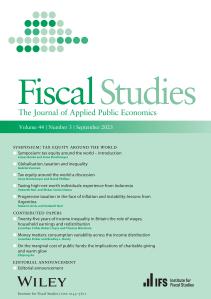The non-dom rules are finally being scrapped. No longer will the UK base taxation on the antiquated concept of domicile — a highly subjective notion of where someone is settled, which can depend on factors including where a person’s father was born and whether their mother was married when they were a child.
Instead, from next year, taxation will be based on residence. Those who have lived in the country for less than four years will pay no UK tax on their foreign income and capital gains. Those here for longer will pay UK taxes on all of their income and gains.
The structure of the new regime, announced in chancellor Jeremy Hunt’s Budget last week, is a clear improvement. But there is scope for reasonable disagreement about exact details. For example, is four years the appropriate point to start taxing newcomers on their foreign income and gains? Deciding such details is often a balancing act between wanting fairness for permanent residents and not wanting to deter newcomers. Determining the balance is difficult because of uncertainty about how newcomers will respond to higher taxes.
There are millions of people who live but are not domiciled in the UK. Most do not have enough foreign income or gains to attract taxes. And, of those that do, almost all leave within seven years. Official estimates suggest that only around 5,500 people will see a larger tax bill. But for this group, tax bills will rise by hundreds of thousands of pounds per year, on average for each person. A large increase indeed, even for a group that has very high incomes.
I don’t expect a mad rush for the ports. Some non-doms have career and family ties in the UK and will pay higher taxes rather than leave. Some will be glad to avoid the intrusion into personal details that can come with claiming non-dom status.
For newcomers, the new regime is more attractive for the first four years because foreign income and gains do not need to be kept offshore to avoid UK taxes. But official forecasts assume that 10 to 20 per cent of those affected will leave. There is high uncertainty around this, and around the extent to which future generations might now decide not to come to the UK. This represents a risk for the public finances: the new regime will raise less than the forecast £3bn per year if fewer (very rich and high tax paying) people decide to live in the UK.
But, panning out, the amounts of revenue at stake are modest relative to the scale of the public finances. This niche part of the tax code got a lot of attention because the Labour party wanted to put “scrapping non-dom rules” in its manifesto. Now it can’t.
The government has in effect spent the revenue to partly pay for National Insurance cuts, which Labour has accepted. Labour could announce a further tightening of the regime. But it would be looking at a small revenue yield at best. And while higher taxes would bring higher revenue potential, there would be greater risk that people will leave.
There are plenty of good reasons to work on the exact design of how new residents are taxed. But this is a minority sport compared to the scale of the public finance challenges facing a future government. UK taxes are rising to historically high levels. Yet many public services are struggling and most departments are due to see real-terms budget cuts in the next parliament. The population is ageing. The challenge of reaching net zero looms large. Growth in gross domestic product is anaemic.
How the Labour party could use taxation of non-doms in its manifesto was always essentially irrelevant to these challenges. We shouldn’t let it be a distraction from the bigger ideas that are needed.









